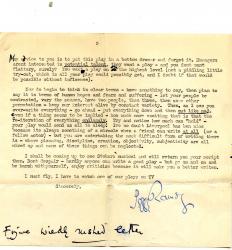
Four Typed Letters Signed (three 'Peggy Ramsay' and one 'Peggy R.') to Goodman, giving her characteristically forthright opinion of his plays.
All four items good, on lightly aged paper. Two of the five leaves have small dog-ears to corners. Goodman has done his accounts on the blank reverse of one leaf. An important collection, in which the most important British post-war play agent reveals, in entertaining and increasingly-brusque terms, the criteria by which she judges scripts. Goodman was hailed by Jacques Barzun as 'the greatest living master of true-crime literature', but his first love was, as his obituary in the Daily Telegraph (16 January 2008) states, the theatre. He began his career in 1951, 'working at the Richmond Theatre, first as a stage manager and then as a producer', before finding jobs in the West End. LETTER ONE (29 May 1955): 4to, 2 pp; 8vo, 1 p. A hundred and twenty lines of hurriedly-written text, with autograph additions and corrections. She has read Goodman's play 'Willow Weep For Me', sent to her by Bill Roderick. She begins by outlining her method. 'My clients are so used to the bitter truth about their plays that I am inclined to think that everybody is prepared for it - clearly I must warn you as I don't suppose Bill did! | Away with compliments! If I didnt think you had real talent I wouldnt bother to tell the truth, but simply return you your script with a polite non-commotal [sic] phrase. I will move on to criticism immediately, as its the only thing which will get you produced.' Goodman is 'obviously a writer who writes from within himself - very right and proper, but, as you know, play writing exacts every kind of talent - involvement, subjectivity, objectivity, planning, creation, etc etc...' There follows a detailed critique of Goodman's play, with particular reference to Tennessee Williams's 'Cat on a Hot Tin Roof'. '[...] I must skip saying a hundred thing [sic] because I have no time to write and you havr [sic] no time to read'. She urges him to decide 'what "great truth" you wish to rest your play upon [...] Your bridge-party at the end of act one is very bad technically - why should the husband leave his guests downstairs to follow him up - simply because you wanted the husband in first - you cant do this kind of thing. You must let one of them have a car and be parking it, or any excuse you like - but tax yourself, be ingenious! Really nothing is too good for a play! | My advice to you is to put this play in a bottom drawer and forget it. Managers arent interested in potential talent, they want a play - and you dont want flattery, surely? You want a play on the highest level (not a piddling little try-out, which is all your play could possibly get, and I doubt if that would be possible without influence). [...] Ive no doubt Liverpool has ben [sic] nice because its always something of a miracle when a friend can write at all (or a fellow actor) - but you are undertaking the most difficult form of writing there is - where planning, discipline, creation, objectivity, subjectivity are all mixed up and none of these things can be neglected.' She will be 'coming up to see Stokers musical' and will return his script then. LETTER TWO (5 March 1956): 4to, 1 p. The play he has sent, 'Chopsticks in Waltztime', is 'an improvement, but I expect you know that it isn't good enough for London'. Goodman still seems to have 'dialogue diarrhoea' and should try and 'discipline' himself more, 'or else turn to writing novels [...] You wrote to me about a plot which I thought rather dank - this is one of your failings (all your plots seem a bit dank)! That no doubt is your youth. [...] Don't be depressed. This is only my opinion, and please seek opinions elsewhere before taking mine as gospel.' LETTER THREE (12 March 1956): 4to, 1 p. Explains what she means by 'dank': 'sordid without being exciting - a sort of dreary realism'. 'I'll read your new play with interest, but I hope the title doesn't mean it's about a woman changing into a man or vice versa, because if so you may be sure hat I shall detest it. This kind of social problem is quite unsuited to dramatic treatment - but I hope I'm maligning you and misconstruing the title!' LETTER FOUR (19 April 1956): 4to, 1 p. She has 'taken a long time' over Goodman's play, 'chiefly because the title was so awful I couldn't bring myself to read it!' Suggests he 'try submittinng this to some other agent', as 'it may be that I am too tough on you.' Goodman has talent and the play is 'in some ways rather amusinng, but all those sex jokes are to me not funny but smutty. Try some theatre, or other agent, and see how you fare, and do please let me know how you are getting on.'


